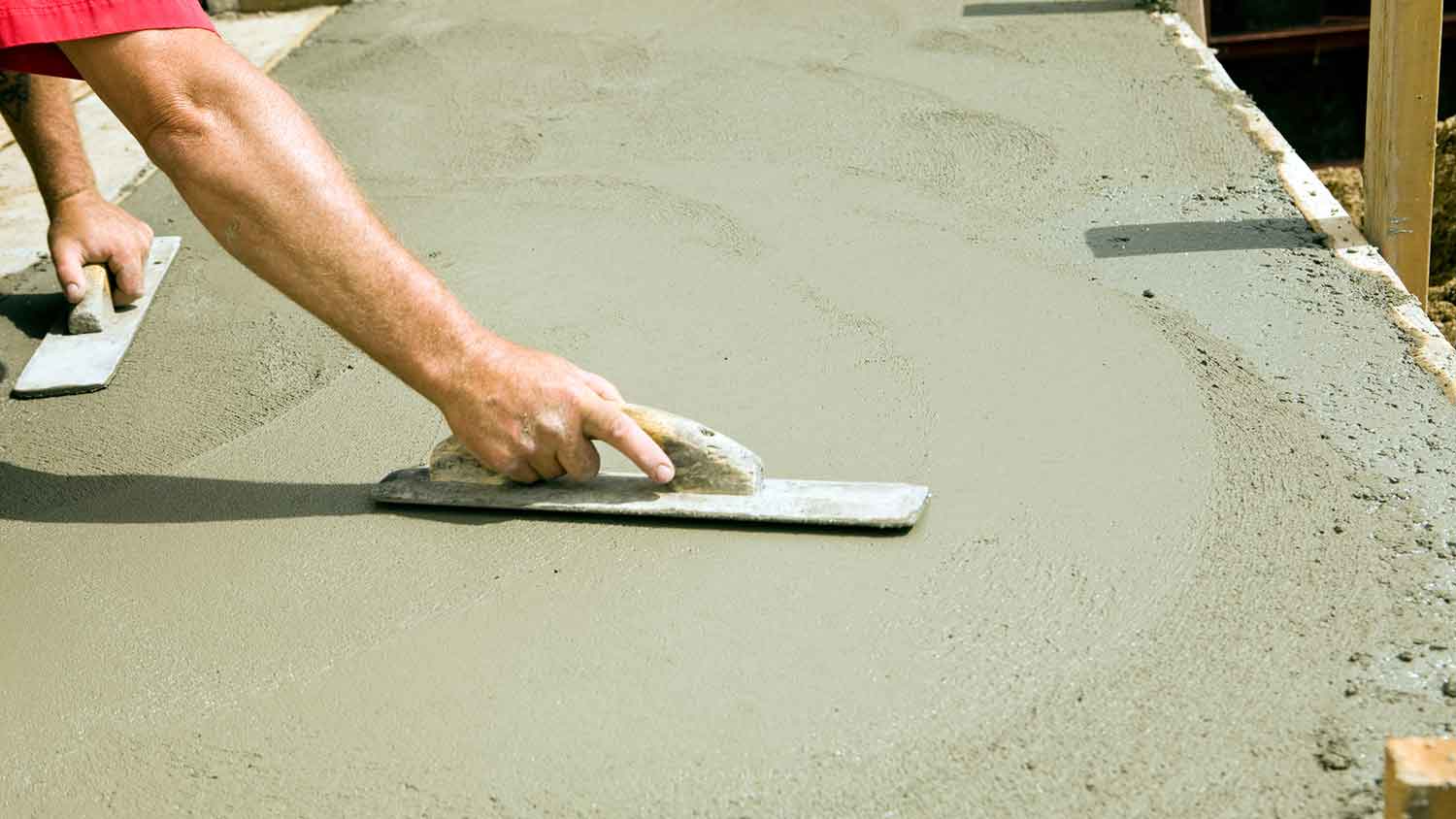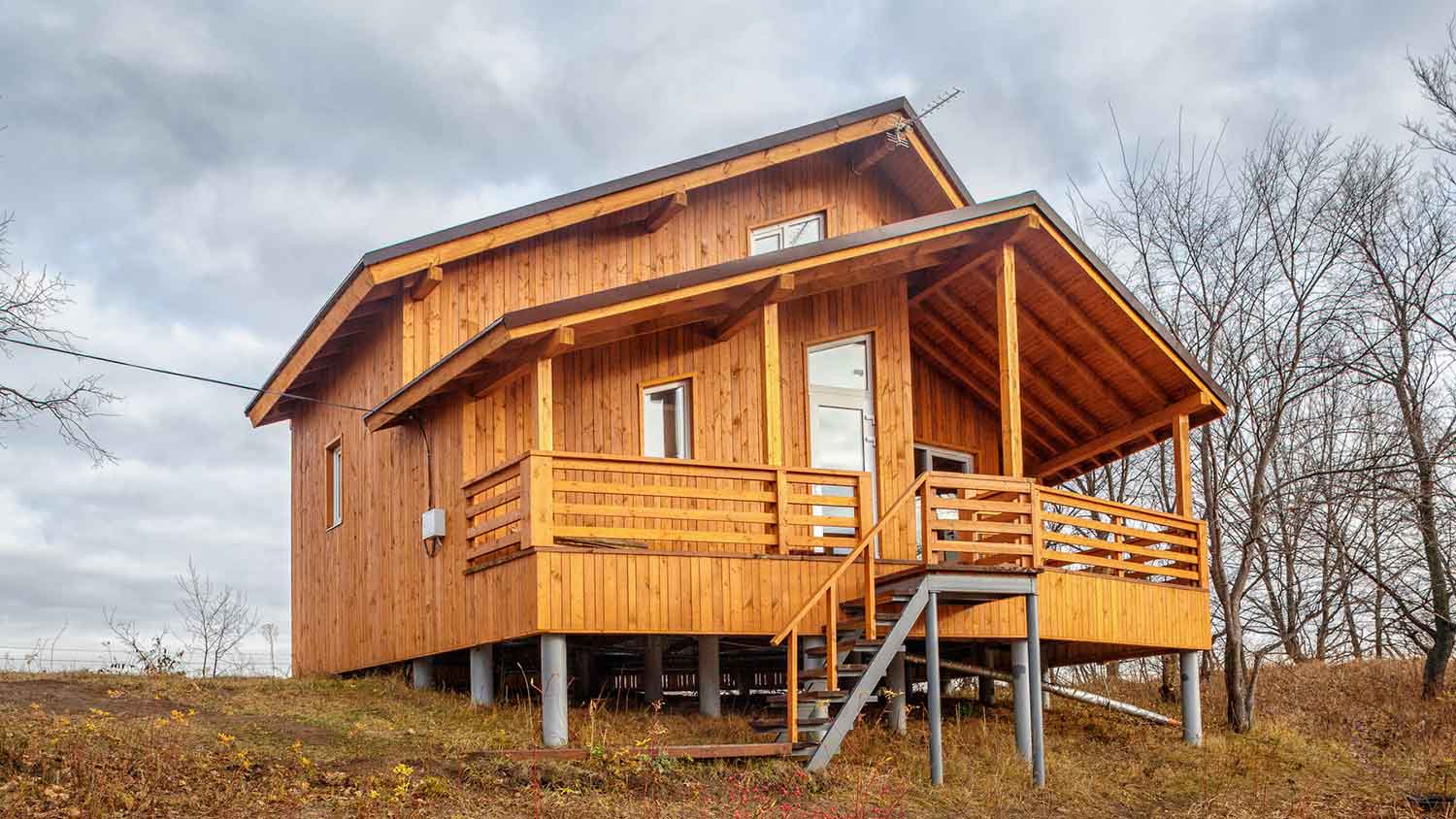16 Questions to Ask a Concrete Contractor
Here’s how to get solid information


1. Are You Licensed and Insured?
Your contractor should be insured so that you don’t end up liable or responsible for any damage that should occur over the course of the project. Insurance requirements vary from state to state, so check with an insurance agent to fully understand what should be included in your contractor’s policy.
Similarly, each state will have its own requirements for contractor licensing. The licensing ensures that your contractor has proper education, training, and required licenses to do the work.
2. What Kinds of Concrete Projects Have You Done in the Past, and How Long Have You Been Working in the Industry?
Ask your contractor how long they’ve been working in the concrete industry and if they have taken on similar projects—you don’t want your home to be a first try at something brand new. There are a wealth of different concrete projects. A concrete driveway contractor won’t necessarily have experience building different types of concrete foundations, but they may have experience with walkways or patios. Make sure the experience aligns.
3. Do You Have Examples of the Kinds of Concrete Surfaces You’ve Installed or Repaired in the Past?
It’s important to look at a portfolio of the contractor's past work to ensure that they can complete the job you want them to complete in the way you want—ask to see photos of similar projects. Some contractors may have a website with photos, and others may simply collect them on their smartphones or be able to show them to you on their laptops or tablets.
4. Can You Provide References?
References are a great way for you to confirm that the contractor’s work was not only up to snuff but that they were responsive, handled roadblocks well, and were overall pleasant to work with.
5. Where Do You Source Your Concrete?

When it comes to concrete manufacturers, quality can vary. For instance, a less reliable source might sell concrete that’s prone to cracks. Learn where your contractor sources their concrete and do your research to know if it’s a product you want in your home.
6. When Can You Do This Project, and How Long Will It Take?
Based on the scope of the project, your contractor should be able to give you a sense of how long it will take to complete. Smaller projects, such as driveways, might be completed in a few days, while large projects could take several weeks.
They should also provide you with an estimated start date, which will depend on the other projects they are working on. This is important because it allows you to plan around the construction if, for example, you won’t be able to use your driveway or they’re building a foundation for a larger scheduled project.
7. Will There Be Damage to My Property?
Some concrete work requires demolition, which can damage lawns, landscaping, and other outdoor features. Ask about any suspected risk to your home.
8. What Will the Permit Process Be Like?
Permits can add time to any home project. A local concrete contractor who is familiar with the area should know the kind of permits required and how long it will take to get them.
9. Who Will Manage the Project?
The contractor you hire might choose to outsource the role of project manager, and it’s important you know who will be working on your home and who you should be communicating with every day in case anything goes wrong. Any established, trusted contractor should be able to answer this question easily.
10. What Is Included in the Final Price?

By asking this question, you should be able to find out if the removal of any existing materials is included in the quote; some projects will require total removal and replacement of existing pavement.
In addition, your contractor should tell you if the cost includes the curing of concrete—many residential concrete contractors do not cure the concrete immediately after it is placed. This is not often a big problem; concrete is very forgiving and sometimes doesn’t show any signs of wear without curing. That said, curing can prevent concrete cracks (crazing) and keep your concrete durable for longer. Ideally, curing will be included in the final price—if the contractor says it isn’t, see how much it would be to add it.
11. What Are the Payment Terms?
Establishing when payment should be made and how will provide important clarity and help you agree to terms that work for both you and your contractor. You might find some contractors require a deposit while others don’t. You might also be able to work out incremental payments for larger projects.
You should always ask your contractor to provide proof of their payment to the concrete supplier; this is important, as an unpaid concrete producer has the right to put a lien on your property until the payment has been processed.
12. Do You Offer a Warranty?
Reputable contractors will offer warranties on their concrete installations to guarantee their work. Be sure to review the fine print of the warranty; some make the process of qualifying for the warranty very difficult.
13. How Long Until I Can Walk or Drive on the Concrete?
Walking or driving on the concrete before it is set could cause it to crack. Have your contractor give you advice as to when the concrete will be secure and able to withstand pressure. Many will tell you to wait at least three—but ideally seven—days before driving on the surface.
14. Do You Need Completed Structural Drawings?
Some concrete projects require drawings from a structural engineer. Your concrete contractor may hire a structural engineer or require you to have the plans drawn out in advance.
Keep in mind, you usually won’t need a structural engineer for smaller projects that fall within building code, such as sealing a driveway or leveling uneven concrete walkways. That said, you’ll definitely need a one for larger projects such as a home foundation or concrete pool.
15. How Would You Fix My Concrete Damage?
If you’re hiring a concrete contractor for repairs, you’ll need to describe the issues you’re having with your existing concrete. This helps your contractor understand the full scope of the project. Damage could include uneven concrete, cracks, efflorescence, settlement issues, or chemical damage.
Your contractor will need to remedy the underlying cause of the damage or it will return. This can require more extensive work than a simple patch. Make sure you describe the rough length, width, and depth of the cracks, since different types of cracks can signal different issues.
16. What Enhancements or Add-Ons Do You Recommend?
When you’re taking on a concrete project, there could be a variety of different upgrades that help the project shine. For example, with driveway construction, contractors may offer stamping for a decorative touch or sealing for durability. In pool construction, your contractor might offer design upgrades like stairs, seating areas, or an add-on hot tub. These enhancements will impact the budget, so talk about them upfront.





- Top Tips on Hiring the Perfect General Contractor for Your Next Project
- 12 Valuable Questions to Ask a Contractor
- How to Dispose of Concrete 5 Ways
- What Questions Should I Ask Before Hiring a Contractor?
- A Crash Course for Hiring a Contractor
- What to Know Before Hiring a General Contractor to Build a House
- 13 Questions to Ask Before Hiring a Contractor
- How to Break Up and Remove Concrete
- 9 Tips and Tricks for Beginners Working With Concrete
- 10 Key Questions to Ask an Interior Painting Contractor Before Hiring Them










